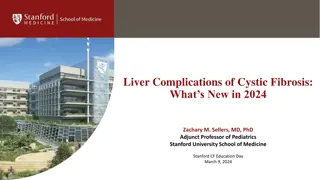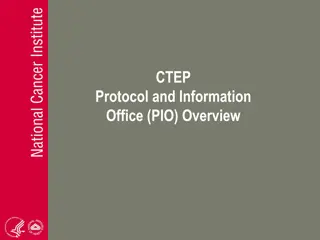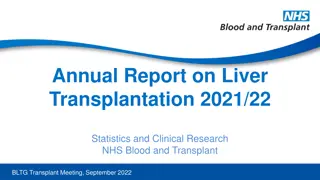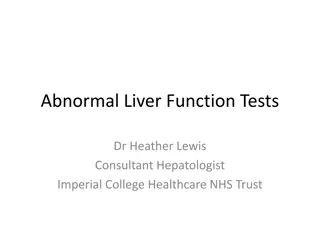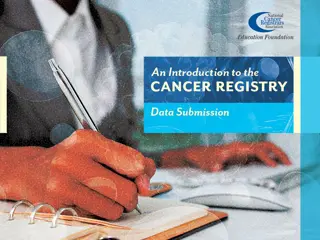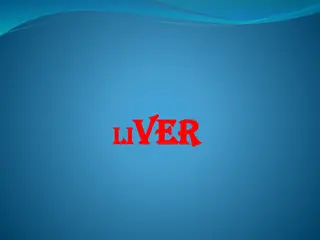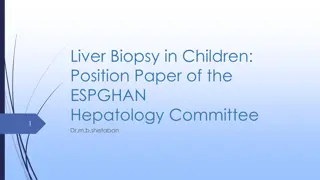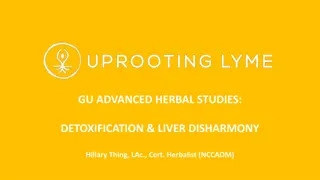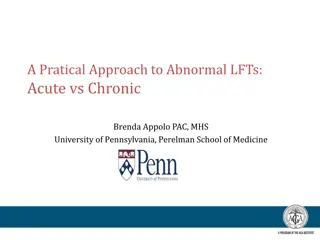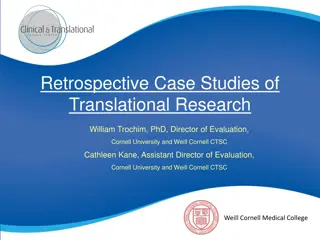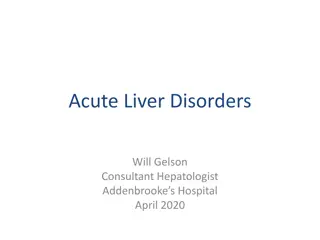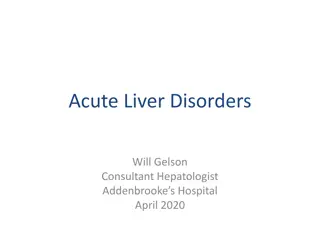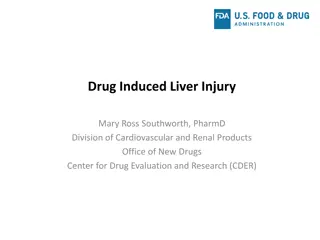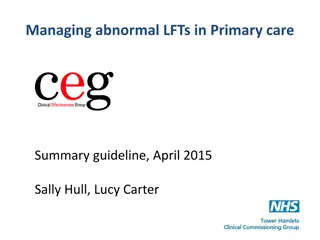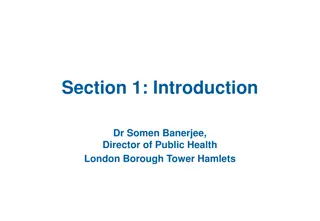Translational Liver Cancer Research Initiatives
Translational Liver Consortia (TLC) and the Translational Hepatocellular Carcinoma Consortium (THCCC) led by Dr. Hashem B. El-Serag are focused on advancing research for early detection of liver cancer. The main objectives include patient stratification for liver cancer risk, surveillance in cirrhosis patients, and early detection strategies. Various institutions are involved in novel research projects for precision risk stratification and screening. Baylor TRC aims to develop personalized risk indices, evaluate blood-based biomarkers, and assess plasma methylation markers for early HCC detection using study cohorts like VASC and CPRIT.
Download Presentation

Please find below an Image/Link to download the presentation.
The content on the website is provided AS IS for your information and personal use only. It may not be sold, licensed, or shared on other websites without obtaining consent from the author. Download presentation by click this link. If you encounter any issues during the download, it is possible that the publisher has removed the file from their server.
E N D
Presentation Transcript
Translational Liver Consortia: TLC and THCCC Hashem B. El-Serag, MD, MPH Chair and Professor Department of Medicine Baylor College of Medicine Houston, Texas
Translational Liver Cancer (TLC) Consortium RFA-CA-17-025/028 establish a Liver Cancer Consortium to advance translational research focused on early detection of liver cancer. TLC is addressing these challenges in HCC research. Main goals: Stratification of patients with cirrhosis, who are at risk for developing liver cancer Surveillance for liver cancers in patients with cirrhosis Early detection of liver cancer 3
Translational Research Center Investigators Principal Investigators Institutions Title Risk Stratification for and Early Detection of Liver Cancer Fasiha Kanwal, MD Baylor College of Medicine Novel Strategies to Improve Liver Cancer Surveillance Uptake and Early Detection Anna Lok, MD, Grace Su, MD; Thomas Wang, MD, PhD University of Michigan George Washington University (LM); University of Maryland (KS); MD Anderson Cancer Center (SL); University of Hawaii (HY) Pathway Specific Functional Biomarkers for the Early Detection of Liver Cancer Lopa Mishra, MD; Kirti Shetty, MD; Shulin Li, PhD; Herbert Yu, MD, PhD Precision Risk Stratification and Screening for HCC among Patients with Cirrhosis in the United States Amit Singal, MD, MSc UT Southwestern Medical Center Xianghong (Jasmine) Zhou, PhD; Samuel French, MD, PhD; Steven-Huy Han UCLA Center in Early Detection of Liver Cancer University of California Los Angeles 4
Baylor TRC: Specific Aims Aim 1. Develop and test novel personalized risk stratification indices for predicting future HCC development in cirrhosis from diverse etiologies Aim 2. Develop and evaluate an algorithm combining existing HCC blood-based biomarkers (AFP, AFPL3, DCP), their longitudinal changes and host features (e.g., cirrhosis etiology) to improve early HCC detection Aim 3. Evaluate novel plasma-based methylation markers for cell- free DNA (MDMs) as an independent surveillance biomarker for early HCC detection
Study Cohorts VA Surveillance Cohort (VASC) Patients with cirrhosis from outpatient clinics at the Houston VA Prospectively followed under active HCC surveillance in Houston between 08/2014 and 12/2016. Follow up 12/2018 Baylor TRC Prospective cohort of cirrhosis patients (CPRIT)
HCC Incidence Rates in Texas 25 20 Age-adjusted incidence rate Hispanic, Texas 15 NH black, Texas Hispanic, Nationwide NH black, Nationwide NH white, Texas 10 NH white, Nationwide 5 0 2001 2002 2003 2004 2005 2006 2007 2008 2009 2010 2011 2012 2013 2014 2015 El-Serag et al 2019
Texas Hepatocellular Carcinoma Consortium (THCCC) Quality of Cancer Cancer Contiuum Diagnosis Detection Risk Primary Prevention Cancer Treatment Assessment
Inclusion Criteria Inclusion Criteria for THCCC Able and willing to provide written informed consent and HIPAA authorization. Candidates must be > 18 years of age Diagnosis of cirrhosis Histopathology US, CT, or MRI showing a cirrhotic/nodular/irregular liver and any of these criteria: - Splenomegaly - Presence of intraabdominal varices - Presence of collaterals - Recanalized umbilical vein - Ascites Elastography done by ultrasound or MRI showing advanced fibrosis A serum marker of hepatic fibrosis (FIB4, APRI, or Fibrotest/Fibrosure) showing cirrhosis or stage 4 fibrosis in the setting of chronic liver disease. Presence of varices on endoscopy or imaging. Clinical history of cirrhosis complications such as ascites and variceal bleeding Exclusion criteria: HCC or uncontrolled ascites or hepatic encephalopathy, metastatic cancer Feng et al. Am J Gastroenterol. 2019;114(3):530-532.
Primary Endpoint Main clinical outcome: incident HCC Detected at least 1 month after an HCC-free baseline assessment Defined by: Histopathological diagnosis Radiological diagnosis using CT or MRI with arterial, portal venous and venous delayed phase One year after HCC diagnosis, sites will ascertain patient s vital status as well as any treatments that they have received for HCC
Total Accrual (New Subjects) as of March 2021 % of Total Registered Institution Name Start Date Total Accrual Michael E DeBakey VAMC 12/21/2016 633 24.2% Parkland Health and Hospital 01/10/2017 497 19.0% System UT Southwestern Medical Center 01/09/2017 452 17.2% at Dallas Baylor College of Medicine 02/09/2017 544 20.8% The Texas Liver Institute 04/20/2017 140 5.3% Baylor Scott & White Research 06/14/2019 186 7.1% Institute 10/8/2019 130 5.0% Doctor s Hospital at Renaissance Baylor All Saints Medical Center 06/04/2020 39 1.5% Total - 2621 100% *Start date is defined as the date that the first subject was enrolled.
Accrual as of March 2021 8406 6737 2621
HCC Cases as of March 2021 Number of Cases Institution Method of Diagnosis 28 Michael E DeBakey VAMC Imaging, biopsy 21 Baylor College of Medicine Imaging Parkland Health and Hospital 17 Imaging, biopsy System 3 The Texas Liver Institute Imaging UT Southwestern Medical Center 13 Imaging, biopsy at Dallas Baylor Scott & White Research 1 Imaging Institute 1 Imaging Doctor s Hospital at Renaissance 84 - Total
HCC Incidence Rate as of December 2020 84 ??? ?????? ????????? ???? = = ?.??% ???,??,???,?? ??????? ???? ???????????? ???? 365.24 Abbreviations: OSD: Off-study date DD: Death date HCC: HCC date Whichever occurs first
Collected Information/Samples Baseline Germline DNA Serum Survey Questionnaire Anthropometric Measures HER Abstraction Liver Imaging Follow up (6-12 months) Serum Liver Imaging Liver Decompensation/Treatment HER Abstraction
Contemporary risk factors for cirrhosis in the U.S Data from Trans-Texas HCC Consortium (THCCC) First 1500 Texas Hepatocellular Carcinoma Consortium Clinical Recruitment Sites Clinical data Data and Analysis Core Biospecimen inventory data Biospecimens & related data Biospecimen & Biomarker Development Core Etiology of cirrhosis 33.1% cured hepatitis C virus infection (HCV) 30.0% alcohol 23.3% nonalcoholic fatty liver disease 16.1% active HCV 2.5% hepatitis B virus (HBV) infection HCV Alcohol MAFLD 75% has metabolic dysfunction without other active risk factors El-Serag H, Kanwal F, et al. Gastroenterology. 2020;159:376-377
THCCC: Cirrhosis Risk Factors in the Main Racial/Ethnic Groups (El-Serag HB et al. Gastroenterology)
Associations with Risk of Incident HCC (preliminary data stratified by NAFLD) Other etiologies NAFLD Overall Age Younger than 65 65 year and older Gender Male Race White African American Hispanics Diabetes No Yes Obesity No Yes (BMI>30) 0.1 0.2 0.4 0.6 0.8 1.0 1.4 1.8 2.2 2.6 3.0. 3.4. 3.8 0.1 0.2 0.4 0.6 0.8 1.0 1.4 1.8 2.2 2.6 3.0 .5.0 Unadjusted hazard ratios (95% CI) Unadjusted hazard ratios (95% CI)
Papers from THCCC Feng Z, Marrero JA, Khaderi S, Singal AG, Kanwal F, Loo N, Beretta L, Ning J, El-Serag HB. Design of the Texas Hepatocellular Carcinoma Consortium Cohort Study. Am J Gastroenterol 2019. Kanwal F, Kramer JR, Mapakshi S, Natarajan Y, Chayanupatkul M, Richardson PA, Li L, Desiderio R, Thrift AP, Asch SM, Chu J, El-Serag HB. Risk of Hepatocellular Cancer in Patients With Non-Alcoholic Fatty Liver Disease. Gastroenterology 2018. Dec;155(6):1828-1837. El-Serag HB, Sardell R, Thrift AP, Kanwal F, Miller P. Texas Has the Highest Hepatocellular Carcinoma Incidence Rates in the USA. Dig Dis Sci 2020. Risk Factors for Cirrhosis in Contemporary Hepatology Practices-Findings From the Texas Hepatocellular Carcinoma Consortium Cohort. El-Serag HB, Kanwal F, Feng Z, Marrero JA, Khaderi S, Singal AG; Texas Hepatocellular Carcinoma Consortium. Gastroenterology 2020. Hernaez R, Kramer JR, Khan A, Phillips J, McCallister K, Chaffin K, Hernandez AP, Fullington H, Ortiz C, Blackwell JM, Loewen A, Liu Y, Tiro JA, Lee SC, Singal AG. Depression and Anxiety Are Common Among Patients With Cirrhosis. Clin Gastroenterol Hepatol 2020. Singal AG, Tiro JA, Murphy CC, Blackwell JM, Kramer JR, Khan A, Liu Y, Zhang S, Phillips JL, Hernaez R. Patient-Reported Barriers Are Associated With Receipt of Hepatocellular Carcinoma Surveillance in a Multicenter Cohort of Patients With Cirrhosis. Clin Gastroenterol Hepatol 2020.
Funded Grants Leveraging THCCC U24: Consortium on Translational Research in Early Detection of Liver Cancer: Data Management and Coordinating Center (HCC-DMCC) Ziding Feng U01: Precision Risk Stratification and Screening for HCC among Patients with Cirrhosis in the United States. Amit Singal U01: Risk Stratification for and Early Detection of Liver Cancer. Fasiha Kanwal BCM Cancer Center: The Gut Microbiome in Cirrhosis and Hepatocellular Carcinoma Aaron Thrift CPRIT: The Texas Collaborative Center for Hepatocellular Cancer Hashem El-Serag R01: Multi-Level Evaluation of Racial/Ethnic and Socioeconomic Disparities in Liver Disease Outcomes Fasiha Kanwal R01: Translation of a biomarker panel for the early detection of hepatocellular carcinoma Jorge Marrero
Texas Collaborative Center for Hepatocellular Cancer Texas Collaborative Center for Hepatocellular Cancer ( (TeCH TeCH) ) Funded by Cancer Prevention and Research Institute of Texas (CPRIT) Funded by Cancer Prevention and Research Institute of Texas (CPRIT) Collaborative Action Program (CAP) Collaborative Action Program (CAP) RP190641 RP190641 , 2019 August 30 August 30th th, 2024 August 31 August 31st st, 2019 , 2024
The goal of TeCH is to reduce HCC mortality in Texas (and the world) by reducing the number of people who develop cancer or detecting it early when it is curable Support and enhance research collaborations among CAP researchers by providing multiple levels of connectivity and necessary research support Setup the framework to educate healthcare providers, researchers, and the public on best practices and to engage private and public entities in policy considerations Engage all stakeholders and solicit strategies to improve HCC-related prevention and care and to best disseminate those improvements Disseminate results on best practices and new opportunities that will impact HCC in Texas
Organizational Structure of TeCH Oversight, Evaluation, and Coordination Research Support and Synergy Dissemination and Implementation Clinical Network Committee Aims to translate and implement innovations into clinical practice to identify best practices related to HCC prevention, early detection and management, and identify gaps in care. Steering Committee Facilitates communication and interaction across committees and CAP research projects. Scientific Committee Focuses on identifying cutting-edge research questions and techniques. Community Outreach Committee Generates culturally sensitive educational material on HCC risk factors, prevention, diagnosis, and treatment targeted at patients and at-risk communities. Administrative Core Data and Biospecimen Core External Advisory Committee Annual Symposium Committee
Newly Funded CPRIT HCC Grants through the CAP Reducing Disparities in the risk of Hepatocellular Cancer Fasiha Kanwal, CPRIT Glycotest Panel analysis in THCCC cohort Amit Singal, CPRIT Genome-wide association study of HCC and cirrhosis progression in Hispanics Aaron Thrift, CPRIT




